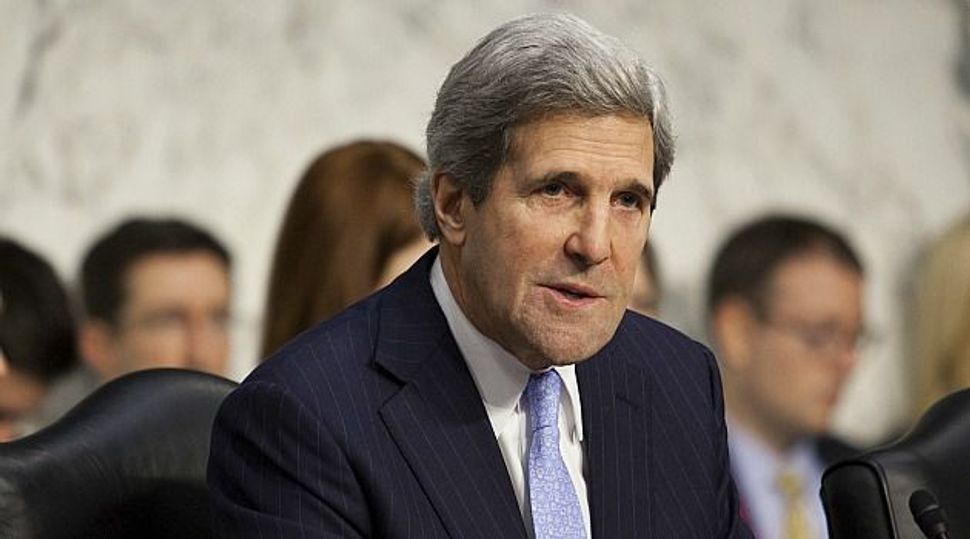Secretary of State Pick John Kerry Talks Tough on Iran and Economy in Senate

Image by getty images
John Kerry urged Congress to fix the U.S. economy to ensure the country’s role as a world leader and pledged to keep pressure on Iran at a Senate hearing on Thursday that left little doubt he will win easy confirmation as secretary of state.
The five-term U.S. senator and Vietnam War veteran said the “first priority” in protecting his credibility as a diplomat was the country’s ability to get its fiscal house in order.
“Foreign policy is economic policy,” Kerry told the Senate Foreign Relations Committee, which he has chaired for the last four years. “It is urgent that we show people in the rest of the world that we can get our business done in an effective and timely way.”
President Barack Obama nominated Kerry last month to replace Secretary of State Hillary Clinton, one of the most popular and visible members of his Cabinet.
The Massachusetts senator was praised by Republicans as well his fellow Democrats during the 3-1/2 hour hearing. Republicans in particular said they appreciated his calls for fiscal order.
“I look at you, in being nominated for this, as someone who has almost led their entire life, if you will, for this moment, being able to serve in this capacity,” said Senator Bob Corker of Tennessee, the top Republican on the panel.
“For a moment I was wishing you had been nominated for secretary of the treasury,” Corker quipped.
“You will need no introduction to the world’s political and military leaders, and will begin – on Day One – fully conversant not only with the intricacies of U.S. policy, but with an understanding of the nuanced approach necessary,” said Senator Robert Menendez, the New Jersey Democrat presiding over the hearing for the committee.
Menendez told Reuters he expects the committee to vote to confirm Kerry by Tuesday – possibly as soon as Monday – with a vote by the full Senate soon afterward.
WILL CONTAIN IRAN
Kerry stressed his commitment to Obama’s policy of seeking a diplomatic solution to persuade Iran to give up its suspected pursuit of nuclear weapons.
Tehran says its program is solely for peaceful purposes.
“He (Obama) and I prefer a diplomatic resolution to this challenge and I will work to give diplomacy every effort to succeed,” Kerry said. “But no one should mistake our resolve to reduce the nuclear threat.”
Kerry said “everybody’s very hopeful that we can make some progress on the diplomatic front now” and that Obama had made clear his willingness to have direct negotiations with Iran if need be.
Critics have said Kerry failed to seek tougher sanctions to discourage the Islamic Republic from pursuing its nuclear program.
Kerry told Menendez, an ardent advocate of tighter sanctions, he was “totally” committed to enforcing them.
Kerry also said during the hearing that he will push for a revival of Israeli-Palestinian peace talks, suggesting the United States could consider a new peace initiative despite the failure of Obama’s first-term efforts.
“We need to try to find a way forward, and I happen to believe that there is a way forward. But I also believe that if we can’t be successful, the door, window … to the possibility of a two-state solution could shut on everybody, and that would be disastrous in my judgment,” he said.
Kerry was greeted with backslaps as he arrived for his hearing and bantered easily with senators, wryly noting his role reversal after spending 29 years sitting up on the dais and questioning witnesses.
“I don’t want this to affect your opening questions, but let me say I have never seen a more distinguished and better-looking group of public officials in my life,” he said, to laughter.
Several senators said they were certain of his confirmation. Menendez said he felt the committee members were satisfied.
One note of discord came when a protester dressed in pink shouted “we need peace with Iran. … I am tired of my friends dying” before being removed by police.
Kerry visited Damascus repeatedly before the outbreak of Syria’s devastating civil war and was a proponent of U.S. re-engagement with Syrian President Bashar al-Assad.
Kerry said there was a moment where Assad, impelled partly by his desire to find jobs for his “burgeoning” youthful population, had an interest in improving relations with the United States, but that he missed the opportunity.
“He has made a set of judgments that are inexcusable, that are reprehensible and I think is not long for remaining as the head of state in Syria,” Kerry said.
The Yale-educated son of a foreign service officer, Kerry, 69, has long specialized in foreign affairs. In the 1960s, he differed from some of his well-heeled peers by enlisting in the U.S. Navy and serving two tours of duty in Vietnam.
He broke from – and enraged – the military establishment by becoming a prominent anti-war demonstrator after returning home. Bitter personal attacks over that role helped cost him the presidency in 2004 when he lost to Republican George W. Bush.
Kerry, who first testified before the committee in 1971 to express his opposition to the Vietnam War, choked up when recalling his father’s service as a career diplomat.
“If you confirm me, I would take office as secretary proud that the Senate is in my blood – but equally proud that so, too, is the foreign service,” he said.






















